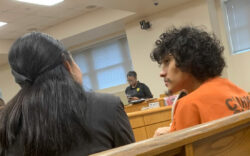A northbound Model T Ford sedan swerved suddenly into the middle of the Georgia highway on Nov. 6, 1931, sideswiping a Model A Ford roadster heading south into Dalton. After impact, the Model T plowed into a mailbox and turned on its side. The Model A flipped over and landed violently in a ditch.
A white couple crawled out of a window of the Ford sedan. The driver, Roy Helton, approached four injured African Americans sprawled out along the highway. Edward Davis was unconscious in front of the Model A. Nina Mae Johnson lay just behind where the car landed. Juliette Derricotte, the roadster’s driver, was semiconscious. Miriam Price was able to climb out of the ditch from under the car. Apparently unhurt, Helton told them he would go for an ambulance. He and his wife righted their vehicle and drove off.
No ambulance came. Instead, another white couple who lived nearby and had witnessed the crash loaded the critically injured Johnson into the back seat of their car. A passerby put Derricotte into his car. A third driver picked up the least-injured Davis and Price. All three vehicles went into Dalton, about one mile away, to seek medical help. The public hospital there, George W. Hamilton Memorial, did not treat African Americans, nor were there any Black doctors in Whitfield County.
The injured were taken to the offices of two white doctors, who then had them moved to the six-room cottage home of a Black woman where Dalton’s “Negro” patients were regularly treated. The home was euphemistically known as the “colored sanitorium.”
After several hours, a white doctor determined that Derricotte and Johnson should be sent by ambulance to Walden Hospital in Chattanooga—a one-hour drive north—and not to nearby Hamilton Memorial. Johnson died en route to Chattanooga from a cerebral hemorrhage. Derricotte survived the trip but died the next evening, Nov. 7.
The front-page headline in a prominent Black newspaper, New York Age, read: “Juliette Derricotte, Dean of Women at Fisk University, Former Student Y.W. Secretary, Killed in Accident.”
Derricotte, along with three Fisk University students, was traveling from Nashville to Athens, her hometown. They had decided to make the journey by car to avoid the humiliation of traveling in a Jim Crow rail car. Because she was one of the fatalities, the crash and its aftermath’s racial implications drew worldwide attention.
Derricotte was born in Athens in 1897. Her parents, Ike and Laura, were former slaves. They lived on Hancock Avenue. Juliette was one of nine children.
As a young girl in Athens, Juliette Derricotte learned that she would be unable to attend the whites-only Lucy Cobb Institute. Instead, she completed public secondary school in Atlanta and was accepted at Talladega College in northeast Alabama. There, even though all of her professors were white, Juliette emerged as a student leader, a gifted public speaker and debater. She became president of the campus YWCA. A decade later, in 1929, she would become Talladega College’s first female trustee.
Upon graduating from Talladega College, Derricotte enrolled in a summer course at the National YWCA training school in New York City and became secretary of the YWCA’s National Student Council. Convening conferences throughout the United States to encourage coalition-building between people of color around the world, she helped the council become an interracial fellowship and a part of a growing Black internationalist movement.
In the mid-1920s, Derricotte traveled to England, North Africa and India, representing the World Student Christian Federation. It was the seven weeks in India that solidified her commitment to racial and economic justice and helped formulate a theological and political response to the Jim Crow South. In India, she witnessed firsthand the cruelty of imperialism’s racial ideology. “The wealth as well as the physical poverty of India haunts me,” she wrote. “I ache with actual physical pain when I remember the struggles of all India today.”
Derricotte was on the vanguard of activists, many of them women, who laid a theological blueprint for an American racial justice movement. In 1927, she received her master’s degree in religious education from Columbia University. Two years later, she was appointed dean of women at Fisk University. Her work attracted the attention of African American scholars and activists like W.E.B. Du Bois.
Her death brought with it a nationwide outcry of grief and anger. “When the news of their deaths reached Nashville,” remembered historian and Fisk graduate John Hope Franklin, “the entire [Fisk] campus plunged into a period of mourning and outrage that the university had lost students and a young administrator to segregationist practices.”
The NAACP, YWCA and the Southern Commission on the Study of Lynchings all demanded investigations into the catastrophe. Franklin said that the “tragedy that befell the dean of women and some Fisk students in Georgia taught all of us what we could expect in the American South.” In a Crisis magazine editorial, Du Bois quoted Ethel Gilbert, a white Fisk staff member and one of Derricotte’s closest friends: “I shall always have to compare in my mind all of the things that were done that would not have been done to me if I were injured. I shall always have to remember that, within one-half hour of the accident, I would have been in a modern hospital.”
Derricotte was 34 when she died. Her funeral service was held on Nov. 9, 1931 at First AME church on North Hull Street. She was buried in Gospel Pilgrim cemetery. Following her death, memorial services were held around the country. A women’s dormitory was built and named after her at Talladega College. Sue Bailey Thurman established a “Juliette Derricotte” scholarship that enabled minority women to travel abroad for study.
Sadly, no memorial markers exist here in Derricotte’s hometown. Even her gravestone at Gospel Pilgrim has been lost to tree roots and overgrown ravines.
Howard Thurman, the prominent theologian and close friend of Derricotte, came to Athens to preach the eulogy at her funeral. He challenged the mourners gathered at First AME: “There is work to be done and the ghosts will drive us on. This is an unfinished world; she has left an unfinished task. Who will take it up?”
Like what you just read? Support Flagpole by making a donation today. Every dollar you give helps fund our ongoing mission to provide Athens with quality, independent journalism.








Jim Crow Killed Athens Educator Juliette Derricotte
A northbound Model T Ford sedan swerved suddenly into the middle of the Georgia highway on Nov. 6, 1931, sideswiping a Model A Ford roadster heading south into Dalton. After impact, the Model T plowed into a mailbox and turned on its side. The Model A flipped over and landed violently in a ditch.
A white couple crawled out of a window of the Ford sedan. The driver, Roy Helton, approached four injured African Americans sprawled out along the highway. Edward Davis was unconscious in front of the Model A. Nina Mae Johnson lay just behind where the car landed. Juliette Derricotte, the roadster’s driver, was semiconscious. Miriam Price was able to climb out of the ditch from under the car. Apparently unhurt, Helton told them he would go for an ambulance. He and his wife righted their vehicle and drove off.
No ambulance came. Instead, another white couple who lived nearby and had witnessed the crash loaded the critically injured Johnson into the back seat of their car. A passerby put Derricotte into his car. A third driver picked up the least-injured Davis and Price. All three vehicles went into Dalton, about one mile away, to seek medical help. The public hospital there, George W. Hamilton Memorial, did not treat African Americans, nor were there any Black doctors in Whitfield County.
The injured were taken to the offices of two white doctors, who then had them moved to the six-room cottage home of a Black woman where Dalton’s “Negro” patients were regularly treated. The home was euphemistically known as the “colored sanitorium.”
After several hours, a white doctor determined that Derricotte and Johnson should be sent by ambulance to Walden Hospital in Chattanooga—a one-hour drive north—and not to nearby Hamilton Memorial. Johnson died en route to Chattanooga from a cerebral hemorrhage. Derricotte survived the trip but died the next evening, Nov. 7.
The front-page headline in a prominent Black newspaper, New York Age, read: “Juliette Derricotte, Dean of Women at Fisk University, Former Student Y.W. Secretary, Killed in Accident.”
Derricotte, along with three Fisk University students, was traveling from Nashville to Athens, her hometown. They had decided to make the journey by car to avoid the humiliation of traveling in a Jim Crow rail car. Because she was one of the fatalities, the crash and its aftermath’s racial implications drew worldwide attention.
Derricotte was born in Athens in 1897. Her parents, Ike and Laura, were former slaves. They lived on Hancock Avenue. Juliette was one of nine children.
As a young girl in Athens, Juliette Derricotte learned that she would be unable to attend the whites-only Lucy Cobb Institute. Instead, she completed public secondary school in Atlanta and was accepted at Talladega College in northeast Alabama. There, even though all of her professors were white, Juliette emerged as a student leader, a gifted public speaker and debater. She became president of the campus YWCA. A decade later, in 1929, she would become Talladega College’s first female trustee.
Upon graduating from Talladega College, Derricotte enrolled in a summer course at the National YWCA training school in New York City and became secretary of the YWCA’s National Student Council. Convening conferences throughout the United States to encourage coalition-building between people of color around the world, she helped the council become an interracial fellowship and a part of a growing Black internationalist movement.
In the mid-1920s, Derricotte traveled to England, North Africa and India, representing the World Student Christian Federation. It was the seven weeks in India that solidified her commitment to racial and economic justice and helped formulate a theological and political response to the Jim Crow South. In India, she witnessed firsthand the cruelty of imperialism’s racial ideology. “The wealth as well as the physical poverty of India haunts me,” she wrote. “I ache with actual physical pain when I remember the struggles of all India today.”
Derricotte was on the vanguard of activists, many of them women, who laid a theological blueprint for an American racial justice movement. In 1927, she received her master’s degree in religious education from Columbia University. Two years later, she was appointed dean of women at Fisk University. Her work attracted the attention of African American scholars and activists like W.E.B. Du Bois.
Her death brought with it a nationwide outcry of grief and anger. “When the news of their deaths reached Nashville,” remembered historian and Fisk graduate John Hope Franklin, “the entire [Fisk] campus plunged into a period of mourning and outrage that the university had lost students and a young administrator to segregationist practices.”
The NAACP, YWCA and the Southern Commission on the Study of Lynchings all demanded investigations into the catastrophe. Franklin said that the “tragedy that befell the dean of women and some Fisk students in Georgia taught all of us what we could expect in the American South.” In a Crisis magazine editorial, Du Bois quoted Ethel Gilbert, a white Fisk staff member and one of Derricotte’s closest friends: “I shall always have to compare in my mind all of the things that were done that would not have been done to me if I were injured. I shall always have to remember that, within one-half hour of the accident, I would have been in a modern hospital.”
Derricotte was 34 when she died. Her funeral service was held on Nov. 9, 1931 at First AME church on North Hull Street. She was buried in Gospel Pilgrim cemetery. Following her death, memorial services were held around the country. A women’s dormitory was built and named after her at Talladega College. Sue Bailey Thurman established a “Juliette Derricotte” scholarship that enabled minority women to travel abroad for study.
Sadly, no memorial markers exist here in Derricotte’s hometown. Even her gravestone at Gospel Pilgrim has been lost to tree roots and overgrown ravines.
Howard Thurman, the prominent theologian and close friend of Derricotte, came to Athens to preach the eulogy at her funeral. He challenged the mourners gathered at First AME: “There is work to be done and the ghosts will drive us on. This is an unfinished world; she has left an unfinished task. Who will take it up?”
Like what you just read? Support Flagpole by making a donation today. Every dollar you give helps fund our ongoing mission to provide Athens with quality, independent journalism.
Adoptable Animals at ACC Animal Services
Should Georgia Change Quarterbacks in Midstream?